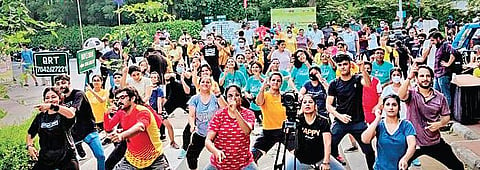

Delhi’s pollution levels have gone back to an all-time rise with the Air Quality Index docked at 446 on Saturday, plunging to the ‘severe’ category. Every year, as the Capital faces the deadly smog due to burning of firecrackers on Diwali and crop residue, a task as simple as breathing becomes difficult for citizens. Keeping this in mind, the Dialogue and Development Commission (DDC) of Delhi, a think tank of the Delhi Government, is organising six ‘Raahgiri Days’, India’s first sustained car-free citizen initiative.
The event, which will take place over the next three months, is in collaboration with non-governmental organisation Raahgiri Foundation, and the research organisation World Resource Institute (WRI) India. The first event will commence today on the occasion of Children’s Day from 7am to 10am in Patparganj. Under the anti-pollution campaign ‘Yudh Pradushan ke Virudh’ by Delhi Chief Minister Arvind Kejriwal, the Raahgiri Foundation will host a range of street activities such as walking, cycling, Zumba practise, painting, live music performances, and flash mobs, to name a few.
Making a sustainable impact
Raahgiri Days are focused on attempting to reclaim and pedestrianise the streets. “We try to implement behavioural shifts in the minds of people by letting them imagine what our streets could be. The idea is to get more cars off the street and subsequently reduce our carbon footprint,” says Sarika Panda Bhatt, co-founder of the Raahgiri Foundation.
Deriving its name from raah, which means path, and giri taken from ‘Gandhigiri’—a non-violent resistance practised by Mahatma Gandhi, the Foundation aims to take ownership of the streets for community leisure activities. The programme began in 2013 in Gurugram during a time when air pollution had become a glaring issue in the country. Similar to the Ciclovía, a mass recreation event that first began in the Colombian capital of Bogotá in 1974, Raahgiri Day is an initiative to conduct ‘open streets’ exclusively for cyclists and pedestrians, while restricting automobiles.
An ongoing endeavour
“I think one of the issues right now is that pedestrians are not prioritised on our streets at all,” shares Bhatt. Through this initiative, the foundation wants to achieve equitable streets that are safer, with lesser pollution. Bhatt adds that people need to understand that creating safer roads ultimately saves lives. Reaching out to local governments to perform road closures on Sundays, Raahgiri Days have been implemented in almost 70 different states till date.
Denizens are expected to throng to today’s event from different parts of Delhi-NCR. “It is important that we continue to push to educate and raise awareness about these issues, to both those at the top and the citizenry,” Bhatt concludes.